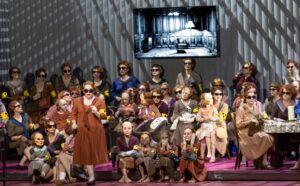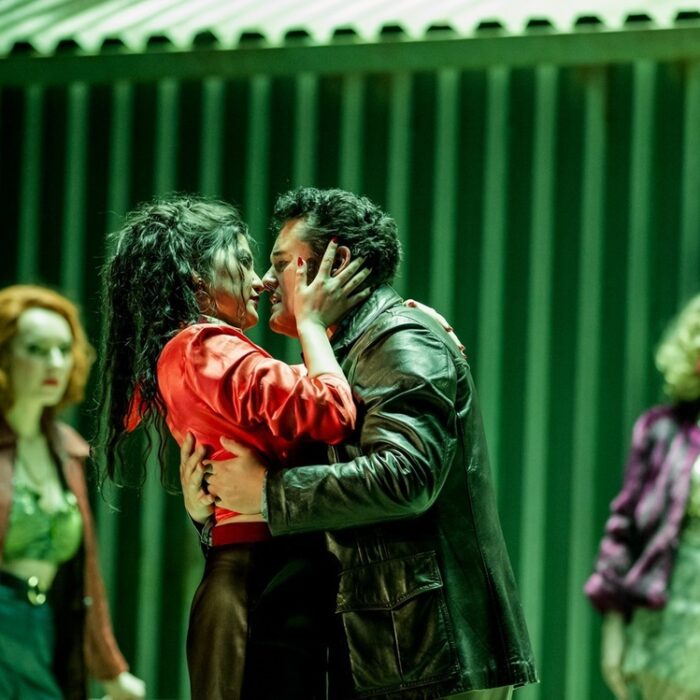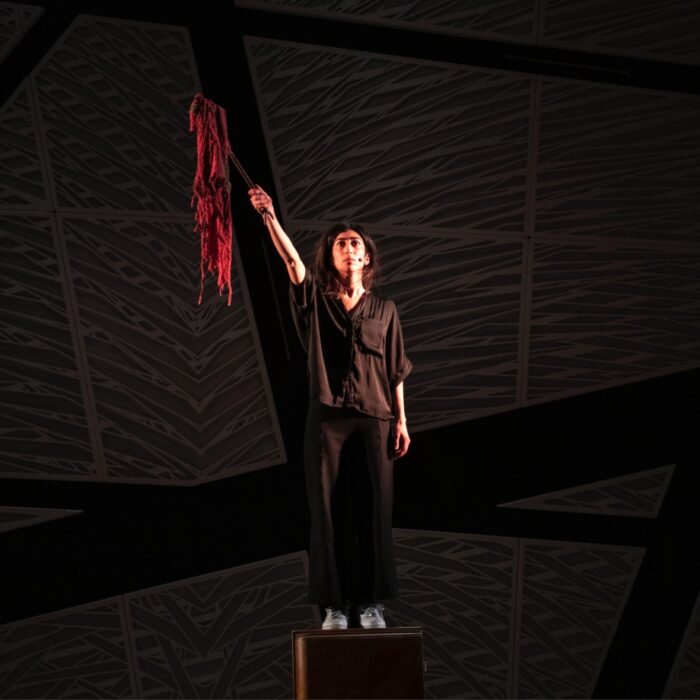
Salzburg Festival 2023 Review: Macbeth
Jonathan Tetelman Shines Brightest in a Production that Seems to Lose Sight of Verdi
By João Marcos CopertinoPhoto credit: SF Bernd Uhlig
In one of his literary excursions, the great Portuguese author Eça de Queiroz reviewed the premiere of Verdi’s “Macbeth” in Lisbon. He did not see the original Italian version of the opera, but the revised French one and quite likely with the same cast as in Paris. Eça insisted that Verdi was the greatest living Italian composer—the only “serious one” after Rossini’s retirement. But, he thought that Verdi really did not get the somber spirit of the Bard. For Eça, the power of Shakespeare’s play lies in the lack of explanation or origin for the Macbeths’ wickedness.
In Verdi’s opera, by contrast, this wickedness is explained by what he called their “materialism.” In the broadest possible sense of the word this included power and money.
Wickedness
Maybe less materialistic is the explanation it gives. Krzysztof Warlikowski’s “Macbeth” also tries to make the wickedness justifiable, or at least traceable. The terms of its tracing are mytho-psychological. There are three main sources, or allusions to sources, for the Macbeths’ evil.
First, is their inability to have children. We even see the most uncomfortable of all OBGYN consultations in the first act, all while the witches prophesies about Macbeth and Banquo’s prospects. To put it simply, the Macbeths are resentful because they can’t have children. However, many gay male gay couples face the same drama. Are they wicked, too?
To be scrupulous about the sources, the original Lady Macbeth—a historical figure who was one of two sources for Shakespeare’s character—did have children. So did Lady Macbeth in the play, since she states she has known the sensation of a baby sucking on her nipples. However, the historical figure also had to bear the first name of Grouch. More than a fair reason to seek ladyship, such a name certainly would have wounded anyone’s soul, even in medieval Scotland.
The second source of wickedness in Warlikowski’s envisioning of the play are the mythical aspects that are traceable in Macbeth. As usual, the Polish director feels comfortable quoting great films, and in this production the most indelible references are Pier Paolo Pasolini films, “Oedipus Rex” and “The Gospel According St. Matthew.” These references rescue a particularly striking aspect of the last century, especially for queer intellectuals, an elegy to a web of myths that would by themselves explain reality by abolishing the modern/ancient dichotomy. Although, not an explanation of the Macbeths’ evilness per se, it works to revitalize Shakespeare’s legacy. Albeit indirectly through Verdi, it reminds us not only that the Bard’s work is everywhere, but that his texts did indeed talk about everything. Macbeth is also a less ostentatious Oedipus. He is also Herod, and Macduff is St. Joseph and so on, and so on.
Finally, the third factor is a constant in Warlikowski’s productions. I am thinking especially of his other semi-Shakespearean excursion in Paris Opera’s production of Ambroise Thomas’s “Hamlet.” There is a social wickedness that derives from all the places in modern society that try to teach us to be docile. Hence his fascination with schools, sports arenas, hospices, hospitals, and even doctor’s practices. These are places where we are taught to behave in a certain way, in order to be acceptable in modern society. Rightfully, the staging tries to express how these experiences of indoctrination can have, within themselves, something of a brutalizing effect that ultimately makes for barbarism. On a similar note, the witches’ chorus is represented by women who are literally radioactive. They cannot inhabit society, through no fault of their own.
Such prolific imagery risks internal contradictions, but it does allow “Macbeth” to be “explainable.” But, one must put in a lot of thought for a minimally satisfactory explanation. However, the best moments of Salzburg’s “Macbeth” might happen when things are just brutal. At the end of the second act, we are forced to watch a dinner scene with a series of babies served on silver plate. The babies are, of course, just plastic dolls to enhance the uncanniness of the experience. Then, this heart-burning meal is projected on the grand curtain as the public head to their well-deserved bathroom breaks. The image, repulsive and disgusting, is not unconnected to Shakespeare’s sense of brutality. In fact, it might allude to the violent power within Jacobean and Elizabethan plays. Like, recalling body horror moments in “Titus Andronicus,” “King Lear” and “The Duchess of Malfi.”
A Lost Search for Verdi
The main issue is that more than once, I found myself still in search of Verdi. The scenarios and decors, beautifully designed by Małgorzata Szczęśniak, use and abuse the magnitude of the Großes Festspielhaus’s stage, which sometimes looks even bigger than the Met. The problem is that such set designs are not acoustically efficient. The witches’ chorus was not scary at all. The Vienna State Opera chorus only achieved that overwhelmingly scary sonority in the third act finale, or when they were placed outside the stage and in the corners of the orchestral pit.
The Vienna Philharmonic Orchestra was still making a loud wall of sound. However, this was more appropriate to Verdi than to the other composers they have performed at the festival. Mozart, for instance, or even Alban Berg. Philippe Jordan has a very interesting reading of the opera. The tempi have something mystic about them, creating an atmosphere that is both oneiric and nightmarish. During the prelude, there was a sense of malaise. This is so important to preserve in a performance of “Macbeth.” It gave me chills. I particularly enjoyed the introduction before “Fuggi regal fantasima.” The orchestra was spot on.
A major issue, especially for the protagonist couple, was the Italian pronunciation. It is understandable that operatic singing distorts vowels and consonants for the sake of better phrasing or for a more comfortable use of the voice. This has happened since opera began. However, there were moments in which such phonetic concessions were so striking that it was difficult to grasp the text. This is evident even in the recorded fragments available online. The Salzburgian Macbeths were too comfortable in sacrificing their phonetics, which for me was beyond the pale. When the text is so flexible, we lose any sense of bringing meaning through the uttering of the word. And, that sensation is important even for those who do not speak Italian, German, Russian, Spanish, Tamil, etc. In this Macbeth, things often sounded like a long vocalise without a very distinguishable vowel. I heard many phrases, albeit comfortably projected, sung with little care for consonantal articulations. Maybe if we were in Italy, things would be different.
Asmik Grigorian was the reigning diva of the night. And, let’s be honest, Lady Macbeth is a Diva role. Scenically, Grigorian has all the charisma. Her expressive eyes were shown on the big screen with much success. Her Lady Macbeth refers to an overly glamorous Classic Hollywood diva with several overly aestheticized dresses and haircuts. 1935’s Joan Crawford might be too austere in comparison to Grigorian’s galling gowns.
Vocally, Grigorian is certainly a lighter soprano than the role demands. But, she faces up to that with wittiness. Her voice is more expressive than rounded and based on this her Lady Macbeth works. She pierces the orchestra with the most haunting of cries in the finale of the first act. And, knowing that she will not have the same reverberation in the role’s lower range, Grigorian is smart to sing softer, without sounding as if she is forcing anything there. It is just a smoother resonance, and a slightly less focused sounding. With Jordan’s cooperation in the pit, I could hear her lower range just fine in “La luce langue.” The sleepwalking scene was very awaken. Of course, such vocal sonority comes with a price. There is a less than optimal approach to language, and a voice that sometimes seemed to fade fractions of seconds before the note was supposed cease ringing.
Nevertheless, Grigorian is a star now. This comes from her hard work in singing an anthological Salzburgian “Salomé” in 2019. It seems she conquered the city with her good scenic timing, bold fashion sense, and excellent PR. Opera needs its divas, as the sky needs its stars. Grigorian knows how to perform that role in photos. In Paris, she did a concert wearing sunglasses. Only a self-proclaimed diva could pull that off. But, the sunglasses do not conceal any special vocal abilities. In my mind, she has much room for improvement, especially in the Italian repertoire. She might be adherent of the “fake it until you make it” anthem. Given the applause she received, it may be that it worked for some people in the audience.
Vladislav Sulimsky’s Macbeth castrates himself in the middle of the fourth act. However, during the whole performance his approach to the role seemed intent on emasculating the ill-fated King. Sulimsky’s stage presence only grows as his character falls. Tragedy suits him well. His voice is a bit lighter than what I heard in recordings, but it somewhat worked for the night. A Verdian baritone usually has a generous lower resonance. However, this was missing. His first act monologue worked well, though in the duo, it sounded as if he was dragged along by his wife. Maybe this is how things should sound. Again, the lack of attention to the text compromised a bit of the dramatical urgency for the murdering duo. Similar comments could be made about his banquet scene. It seemed that he was just not insane enough.
Sulimsky does not share the dramatical charisma of his stage peers until the final act. So, there is something somber and of gravity that is missing. Even though his character’s name is on the main poster, his Macbeth is not the center of action. In a fortunate turn of events, he manages to rescue his protagonist as the opera heads towards its conclusion. In a staging that privileged Macbeth’s insane desire for power, his “mad act,” after the castration, actually was fun to watch.
Undeniably Verdian
Although I found myself looking for Verdi many times in this staging, I can guarantee that Jonathan Tetelman’s Macduff was undeniably Verdian. The role of Macduff has something ungrateful about it. Even though it has to be sung by a tenor with abilities no short of extraordinary, he is nevertheless a side character. He is a combination that for some tenors might be unbearable. Thankfully, Tetelman is young enough that Macduff is not yet too little for his star.
The tenor indeed has many elements that make for a strong Italian tenor. For example, his correct enunciation, projected voice, charming looks, scenic gravitas, etc. As an actor he is perhaps not as compelling as Grigorian. But, I think the stakes for acting are lower for a good Italian-repertoire tenor—and those things can be learned. Tetelman was the protagonist in the only moment of Macbeth when all operatic planets were aligned on stage. For example, the beginning of the fourth act. I still struggle to understand why, in this production, his Macduff kills himself at the end of the opera. This is a complete disillusion of power and the fear of corruption. Tetelman made his suicide look as forceful as the series finale of “How I Met Your Mother.”
Of a similar Verdian gravitas, Tareq Nazmi’s Banquo had the vocal pungency to make his presence outlast even his own stage death. It helped that we saw his face in the eerie masks worn by children all over the stage in the second half. But, Nazmi shone particularly because of his solid Bass tone, fair Italian, and fastidious psychology. His approach to his character was as practical as Banquo himself. There were a few issues in his higher range, and sometimes I fear he was overpowered by the orchestra. But, these were minor issues in comparison to his good performance.
The side characters were efficiently executed. Evan LeRoy Johnson is a more than functional Malcom. Aleksei Kulagin was a good doctor. Caterina Piva, Grisha Martirosyan, and Hovhannes Karapetyan share a series of minor roles properly. And, for great dramatical effect and spookiness, the children of the St. Florian chorus share their part as ghosts in the third act. They knew quite well how to move on stage and make the horror come to life. I just wonder what their parents thought when they saw their children, masked as adults, destroying baby dolls like psychopaths.
In a somewhat repetitive staging in terms of Warlikowski’s body of work, Salzburg Festival gives a Verdi that, far from unmissable, is not without its charms. And, given the inner difficulties in staging a proper “Macbeth” nowadays, I appreciate that Salzburg at least tried. It is nevertheless interesting that some basic things were not very well thought-out. This includes the acoustics, staging, and language. Anyway, the house was full, and when in town, why not?


